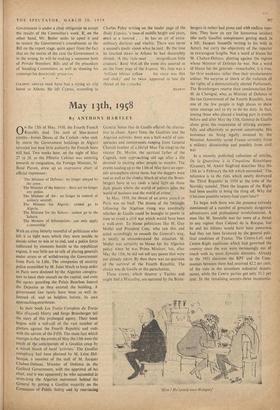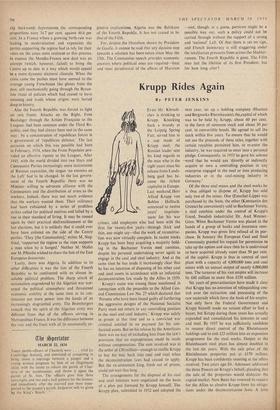May 13th, 1958
By ANTHONY HARTLEY
ON the 13th of May, 1958, the Fourth French Republic died. The mob of blue-jeaned youths—James Deans of the Casbah—who took by storm the Government buildings in Algiers revealed just how little authority the French State still had. Two weeks later, on the night of May 27 to 28, as the Pffimlin Cabinet was tottering towards its resignation, the Foreign Minister, M. Rene Pleven, drew up an impressive chart of official impotence: 'The Minister of Defence: no longer obeyed by the army.
The Minister of the Interior : there are no longer any police.
The Minister of Air: no longer in control of military aircraft.
The Minister for Algeria : cannot go to Algeria.
The Minister for the Sahara : cannot go to the Sahara.
The Minister of Information: can only apply a censorship.'
With an army bitterly resentful of politicians who left it to fight wars which they were unable to decide either to win or to end, and a police force infiltrated by elements hostile to the republican regime, it was little use to talk of placing generals under arrest or of withdrawing the Government from Paris to Lille. The companies of security police assembled by M. Jules Mach to keep order in Paris were destined by the Algerian conspira- tors to head their assault on the capital, and even the agents guarding the Palais Bourbon hooted the Deputies as they entered the building. A government can rarely have been so well in- formed of, and so helpless before, its own approaching overthrow.
In their book Les Treize Complots du Treize Mai (Fayard) Merry and Serge Bromberger tell the story of this prolonged agony. Their book begins with a roll-call of the vast number of Plotters against the Fourth Republic and ends With the advent of the Fifth. The main fact which emerges is that the events of May the 13th were the result of the anticipation of a Gaullist coup by a mixed bunch of local 'activists.' The Gaullist conspiracy had been planned by M. Leon Del- becque, a member of the staff of M. Jacques Chaban-Delmas, Minister of Defence in the Gaillard Government, with the approval of his chief, and it was apparently he who succeeded in wrenching the Algerian movement behind the General by getting a Gaullist majority on the Committee of Public Safety and by convincing General Salan that de Gaulle offered the alterna- tive to chaos. Apart from the Gaullists and the Algerian activists, there was a half-world of con- spiracies and conspirators ranging from General Chassin (author of a life of Mao Tse-tung) to the sinister Dr. Martin, the spiritual father of the Cagoule. now approaching old age after a life devoted to inciting other people to murder. The events leading up to the 13th of May have an oper- atic atmosphere about them, but the daggers were real as well as the cloaks. Much of what the Brom- bergers have to say casts a lurid light on those dark places where the world of politics joins the world of business and the world of crime.
In May, 1958, the threat of an army putsch in Paris was no bluff. The drama of the fortnight following the Alg6rian rising was essentially whether de Gaulle could be brought to power in time to avoid a civil war which would have been .a. walk-over. To blame politicians like M. Guy Mollet and President Coty, who saw this and acted accordingly to smooth the General's way, is totally to misunderstand the situation. M. Mollet was certainly to blame for his Algerian policy when he was Prime Minister, but, after May the 13th, he did not sell any passes that were not already taken. By then there was no question of the survival of the Fourth Republic. The choice was de Gaulle or the parachutists.
These events, which deserve a Tacitus and might find a Macaulay, are narrated by the Brom- bergers in ratheribad prose and with endless repe- lion. They have an eye for humorous incident (the early Gaullist conspirators getting stuck in a lift; Jacques Soustelle writing to his wife in Aztec), but carry the objectivity of the reporter to extravagant lengths. Not a word of blame for M. Chaban-Delmas, plotting against the regime whose Minister of Defence he was. Not a word of blame for the generals—remarkable, it is true, for thcir weakness rather than their revolutionary ardour. No surprise or shock at the violation of the rights of a democratically elected Parliament. The Brombergers reserve their condemnation for M. de Chevigne, who, as Minister of Defence in the last Government of the Fourth Republic, was one of the few people in high places to show some courage and to try to do his duty. In fact, among those who played a leading part in events before and after May the 13th, General de Gaulle alone gives the impression of striving purpose- fully and effectively to prevent catastrophe. His insistence on being legally invested by the National Assembly saved France certainly from a military dictatorship and possibly from civil War.
In a recently published collection of articles, De la Quatriente 'a la Cinquieme Republique (Grasset), M. Andre Siegfried describes May the 13th as 'a February the 6th which succeeded.' The reference is to the riots which nearly destroyed the Third Republic in 1934 at the time of the Stavisky scandal. Then the leagues of the Right had been unable to bring the thing off. Why did it become possible twenty-four years later?
To begin with there was the presence (already mentioned) of a number of genuinely dangerous adventurers and professional revolutionaries. A man like M. Soustelle was far more of a threat to any regime than Colonel de la Rocque, but he and his fellows would have been powerless had they not been favoured by the general poli- tical condition of France. The Centre-Left and Centre-Right coalitions which had governed the country since the war were increasingly out of touch with its more dynamic elements. Already in the 1951 elections the RPF and the Com- munists between them had received 42.2 per cent. of the vote in the seventeen industrial depart- ments, while the Centre parties got only 35.3 per cent. In the remaining seventy-three (economic-
'Him ? He joined over Hungary.'
Ally backward) departments the corresponding proportions were 34.7 per cent. against 40.6 -per cent. In a France where a growing birth-rate was leading to modernisation and expansion the parties supporting the regime had to rely for their votes on the areas most resistant to this process. In essence the Mendes-France new deal was an attempt (which, however, failed) to bring the Centre up to date in a way which would appeal to a more dynamic electoral clientele. When the crisis came the parties must have seemed to the average young Frenchman like ghosts from the past, still mechanically going through the Byzan- line ritual of policies which had ceased to have meaning and feuds whose origins were buried deep in history.
Also the Fourth Republic was forced to fight on two fronts. Attacks on the Right, from Boulanger through the Action Francaise to the Leagues, had been common under the Third Re- public, and they had always been met in the same way : by a concentration of republican forces in a government of 'republican defence.' The last occasion on which this was possible had been in February, 1934, when the Front Populaire pro- vided an effective riposte to the Leagues. After 1945, with the world divided into two blocs and Communist Parties increasingly mere instruments of Russian expansion, the slogan `no enemies on the Left' had to be changed. In the last govern- ment of the Fourth Republic there was no Minister willing to advocate alliance with the Communists and the distribution of arms to the workers. Indeed, there was not much evidence that the workers wanted them. Their militancy had been exhausted by a series of profitless strikes called for political motives and lulled by a rise in their standard of living. It may be roused again by their practical disfranchisement at the last elections, but it is unlikely that it could ever have been enlisted on the side of the Centre parties. 'They [the Communists],' writes M. Sieg- fried, `supported the regime as the rope supports a plan when he is hanged.' Neither M. Monet nor M. Pflimlin wished to share the fate of the East European democrats.
Lastly, there was Algeria. In addition to its other difficulties it was the fate of the Fourth Republic to be confronted with an almost in- soluble political problem. The sharp attack of nationalism engendered by the Algerian war wor- sened the political atmosphere and threatened economic stability at the same time as its con- tinuance put more power into the hands of an increasingly disgruntled army. The Brombergers remark that the spirit of the Algerian army was different from that of the officers serving in Metropolitan France. It was the difference between the rear and the front with all its emotionally ex-
plosive implications. Algeria was the Baltikum of the Fourth Republic. It has not ceased to be that of the Fifth.
For, despite the liberalism shown by President de Gaulle, it cannot be said that any decisive step towards a solution has been taken since May the 13th. The Constantine speech provides economic answers where political ones are required—final and most paradoxical of the effects of Marxism —and, though, at a guess, partition might be a possible way out, such a policy could not be carried through without the support of a strong and 'national' Left. Of that there is yet -no sign. and French democracy is still staggering under the totalitarian pressures from across the Mediter- ranean. The Fourth Republic is gone. The Fifth may last the lifetime of its first President, but for how long after?



































 Previous page
Previous page